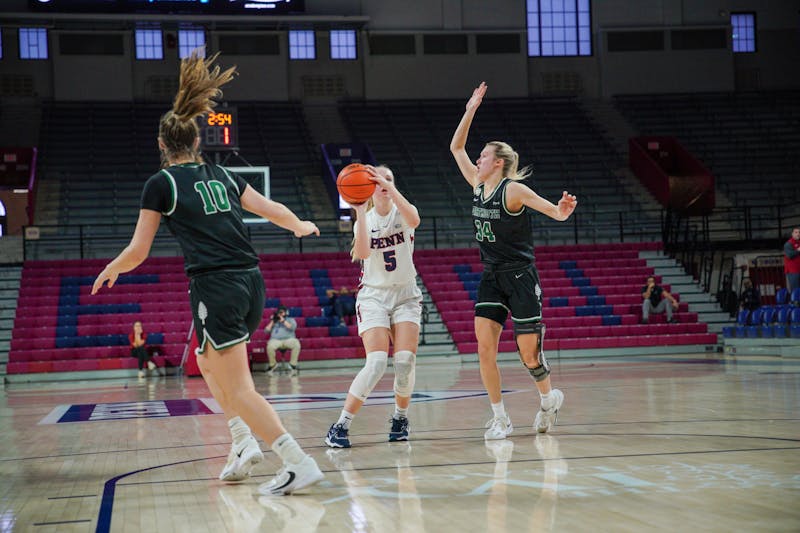Even outside Taksim Square in Istanbul, protesters filled the city’s streets.
“Everywhere in Istanbul, even though I was far away from Taksim Square, you could see the protesters,” said near eastern languages and cultures lecturer Feride Hatiboglu, who was in Istanbul from May 24 to June 3 for a conference on the Turkish language.
What had started as a peaceful protest to prevent Istanbul’s Gezi Park — located in Taksim Square, one of the city’s central landmarks — from being converted into a shopping mall has now evolved into a countrywide protest against the Turkish government and the controversial prime minister, Recep Tayyip Erdogan. The rallies turned violent as police unleashed water cannons and tear gas against protesters and tourists alike.
Several members of Penn’s Turkish community were only blocks away from the violence themselves, while others have friends and family nearby.
The origins of the protest
“People were in the park, reading books, listening to music … and one night at 5 a.m., the police began burning tents.”
That’s how a rising College junior and Turkey native, who requested not to be named, described their friends’ experiences in Taksim Square when the police violence began.
Although they was in Philadelphia when the protests in Taksim started, friends and family in Istanbul reported that the violence escalated quickly. It had “started as a peaceful demonstration to stop bulldozers from going in and demolishing the park,” they said, but the violence of the police officers throwing tear gas at the protesters was a “huge awakening in the Turkish people.”
However, Turkish protesters face threats even beyond police brutality.
“Last Friday, I wasn’t afraid for my own safety — I was afraid for my friends who were being tear-gassed,” said 2012 College graduate Erin, who is currently staying with family in Istanbul and wishes to be identified only by her first name out of fear of reproach by the government. On Sunday, she said, “Now, I am scared to be posting things [online]” because of rumors of arrests that are circulating in Istanbul.
Injuries from the violence have also been reported. Rising College and Wharton senior Naz Ozbek said that some of her friends who participated in the protests lost hearing and vision from tear gas thrown into the crowd. As of press time, there have been two deaths reported as a result of the protests.
However, in recent days the violence has died down. Turkey’s Deputy Prime Minister Bulent Arinc issued an apology to the people who were injured by “excessive force,” reported BBC News Europe.
Peaceful protests
But Hatiboglu, who was in Turkey at the time for a conference, noticed that this protest was different than most others she had seen because the people she saw rallying were not using violence.
“Students, teachers, people with headscarves, high school students [standing] shoulder to shoulder — it was really moving,” she said. “It was very civilized.”
Erin also noted that “weirdly enough, it’s physically safe if you stay away from the [central] protests” in Istanbul. “When I was at the protest [on Sunday], it was filled with kids and old ladies,” she said.
Ozbek noted that the protests were a particular moment of action for young adults in Turkey. “It’s people my age who are on the street right now … [my generation in Turkey] has been criticized before for being ignorant … it’s exciting that we’re standing up, doing something.”
“[The protests I saw] were basically parades on busy avenues where pedestrians walked around waving Turkish flags and shouted the common slogans of the protest in unison, and cars slowly passing by the avenue honked in encouragement of the slogans,” rising Engineering and Wharton junior Ezgi Aytac said in an email.
“This kind of scene usually happens during national holidays as a happy occasion,” she added, “and that was the feeling one got from these events.”
Although Erin said that calling this a “Turkish Spring” is “too much of an exaggeration,” she was still worried because she felt the protests were dividing the country.
“Because of the polarization that these protests have caused … the people who support the government [might] get involved violently,” she said.
Rally beginnings
News of police violence in the protests first started coming in on May 31.
However, protesters had been convening before that date to challenge the government’s decision to replace Gezi Park — the last significant green area in the center of Istanbul — with a replica Ottoman-era army barracks that would contain a shopping mall.
Rising Engineering junior Ben Gitles lived in a youth hostel about three blocks away from Taksim Square while he was volunteering for a non-governmental organization in Istanbul earlier this year and noticed that protesters were already gathering before he left the city on May 29.
“On May 28, we were walking back and saw lots of people sitting on the grass,” he said. “There was food everywhere … [but] there were also riot police around.”
On May 31, however, the message of the protest changed when the violence began.
“The moment this turned from about the park to about the grievances was when the police became violent,” Erin said. “Then [the protest] became about the government.”
Ozbek said these issues are not new. “The government has been in power for ten years. There have been basic human rights abuses, they’re slowly trying to turn the country Islamic and a lot of the journalists who have written against it are in jail.”
Some of the main issues the protesters are proposing include Turkey’s shift toward an Islamically governed country, a ban on the sale of alcohol after 10 p.m. and before 6 a.m. and Erdogan’s attempts to alter the Turkish Constitution to create a more powerful presidency — a position he is planning to run for next year.
Although he initially supported the protesters who wanted to preserve Gezi park, rising Engineering senior and Co-President of the Turkish Student Association Eza Koch said that he is “not in a huge support of the movement now.”
“I initially supported the smaller protests in the park,” Koch said. “[But] now, even the initial protesters have noticed that [the protest] is getting out of control” and that it is “harming the country” and “destroying the city.”
Although he understands the concerns of those who are currently protesting against the government’s rule, Koch said that the protests are “not something the entire county supports.” In fact, he noted that most of the country supports Erdogan, as this is the third time that the prime minister has been elected into office.
‘Amazing’ social media
However, social media has brought together protesters against Erdogan’s government from Turkey and around the world.
Although rising College and Wharton sophomore Deniz Ertan is not currently living with her family in Izmir, Turkey, she — like many others — participated in protests around the world and became involved through various websites and Twitter.
“I’m not physically there, but I have been trying to help [the protesters] … by providing them with information” for resources like doctors and lawyers, Ertan said.
Because of the censoring done by some Turkish press outlets — which Erin noted was most prominent when CNN Turk played documentaries about penguins rather than covering the protests in Istanbul and across the country — one of Ertan’s friends created a website that she helped with by translating articles from global news outlets into Turkish, so that residents could maintain awareness of the protests.
In what Erin called an “amazing use of social media,” Twitter users have started to trend the slogan “#occupygezi” to monitor and discuss the protests, and there is now a Tumblr page devoted to news from the Istanbul protests as well as a Google Map designed to alert protesters of the locations of police.
“So far I’ve been using social media to share my friends’ statuses in order to spread news of police activity and warn peaceful protesters away from danger, and raise awareness for the human rights violations going on in my country,” said Aytac, who is currently living in the Asian part of Istanbul. “For the first few days, social media proved to be more useful than national TV channels anyway.”
The rising College junior added that social media was also playing a role in organizing the protests themselves, noting that “when some people go out of control … on social media, [protesters] warn each other ‘don’t make us look guilty.’”
However, not all are pleased with the role Twitter has played. “There is now a menace which is called Twitter,” Erdogan said in a Huffington Post article. “The best examples of lies can be found there. To me, social media is the worst menace to society.”
Lending a hand
Penn has been doing its part to make sure students and faculty abroad in Turkey remain safe.
“We have reached out to Penn travelers currently in Turkey to ask if they are O.K., provide a security update and offer assistance,” Penn’s Director of International Risk Management Jaime Molyneux said in an email. “Travelers that have registered in Penn’s Global Activities Registry are receiving daily security reports and travel advice from International SOS” — an organization which provides international health care, medical assistance and security services.
As of June 6, there will be six members of the Penn community in Turkey that are registered with the Global Activities Registry, Molyneux said, although she noted that there might be more people who are currently there but aren’t registered.
According to the U.S. State Department and International SOS, travel to Turkey can continue. Penn Abroad will not cancel its fall study abroad program in Turkey, Molyneux added, which means the five students set to study abroad there will be able to.
Molyneux also noted that Penn has reached out to all affiliated travelers in the Global Activities Registry who are currently in Turkey or with trips planned this summer to remind them to “exercise caution and avoid all known or potential protest locations.”
Responses from abroad
Although the violence has been contained in Turkey, the spirit of the protests has spread across the world.
In France, a protest was held on Tuesday in Paris at La Fontaine des Innocents, a public fountain. Ertan said that the area was “very crowded” and filled with “very witty posters and slogans.”
In Philadelphia, students from local universities — including Penn — organized a rally in Love Park. In New York, nearly 3,000 people went to a protest against the violence in Turkey in Zuccotti Park — the former home of the Occupy Wall Street movement.
Penn’s Turkish students have also taken to Facebook to spread information about the situation in their home country.
Koch, of the Turkish Student Association, said that he has “been in contact with students who are abroad in Istanbul, making sure they are okay.”
“I hope global media can help,” the rising College junior, who has posted frequent pictures, clips and news stories on their own Facebook page since the protests began, said. “That’s what we’ve been trying to do on Facebook — let people know.”
Editor's Note — April 8, 2025: This article has been updated to remove the name of an individual quoted out of concern for personal safety.
The Daily Pennsylvanian is an independent, student-run newspaper. Please consider making a donation to support the coverage that shapes the University. Your generosity ensures a future of strong journalism at Penn.
DonatePlease note All comments are eligible for publication in The Daily Pennsylvanian.









